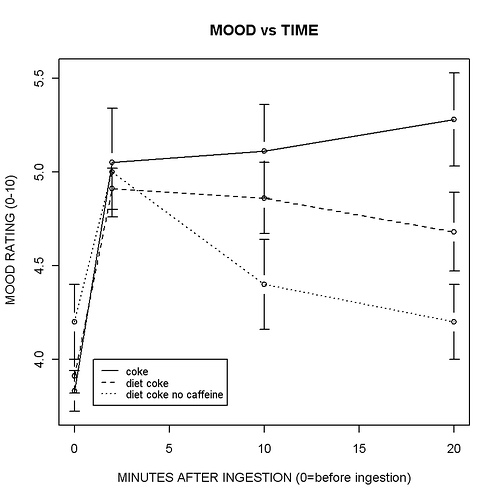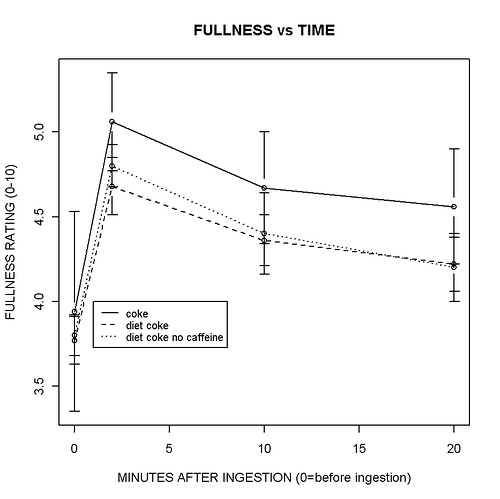John Keltner, an M.D./Ph.D. at Oxford, guest-blogged earlier about a self-experiment to measure the effect of Coke on his mood. Below he describes his results in more detail.
I did a self-experiment to measure the mood and hunger effects of consuming 30 oz of Coke, Diet Coke With Caffeine, and Diet Coke Without Caffeine. I used two numerical rating scales. For the mood scale 0 represented profound dysphoria, 5 neutral mood, and 10 profound euphoria. For the hunger scale 0 represented profound hunger, 5 no hunger or fullness, 10 profound fullness.
Each day before dinner (after ~ 7 hours of not eating anything but water), I measured my mood and hunger/fullness at four times: right before drinking 30 oz of soda, right after drinking the soda, 10 min after, and 20 min after.
I collected the data in two ways: blinded and not blinded. The 3 drinks were consumed in a random order.
The experiment lasted 25 days – one drink per day.
At the end of the 25 days there were a couple of measurement categories with only 2 or 3 data points, so I have combined the blinded and not blinded data for the purposes of presenting the data here.
The figures below show means and standard errors.


Within 10 minutes (and stronger at 20 minutes) there appears to be a significant change in mood ratings for the sugar and caffeine coke drink compared to the non-sugar and non-caffeine coke drink. Furthermore, it appears that caffeine alone was able to cause an increase in mood at the 10 minute and 20 minute time points between diet+caf coke vs diet w/ no caf coke. Finally, it appears that effects of sugar and mood are additive.
There was not a large difference in the fullness ratings between the three different drinks.
It is also notable that mood and fullness were markedly increased for all drinks immediately after consuming the drinks. Presumably this immediate increase in fullness and mood has more to do with the immediate taste or volume affects of the drinks and less to do with the calories or caffeine in the drinks.
In my next experiment investigating mood effects of sugar and caffeine I will reduce the number of parameters in my experiment. I spent a month collecting this data and a fair amount of effort (blinded data are hard to collect). Because I chose three types of coke drinks (sugar+caf, no sugar but caf, no sugar and no caf), two parameters to examine (hunger and mood), and two conditions (blind and non-blinded) my data points were spread too thin over the categories. Next experiment I will choose just two drinks (caf vs no caf), one condition (blinded), and I would focus on mood instead of hunger.
This experiment leads me to believe that a number of smaller experiments are more effective than one large experiment – at least in the beginning.
I would like to thank Seth Roberts (a lot!) for his generous helpful suggestions as I pursued this self experiment. I initiated the experiment on my own, but I would not have finished it without Seth’s help.
There’s a variable I wish he would have measured (though I can understand why he wouldn’t have thought to)… consuming colas, even diet ones, causes very strong carb cravings on the evenings of any day a cola has been consumed…even many hours after the soda consumption. ie, drink water all day long – minimal munchies at night. Drink diet coke with lunch – ravenous munchies at night.
Bizarre, but true.